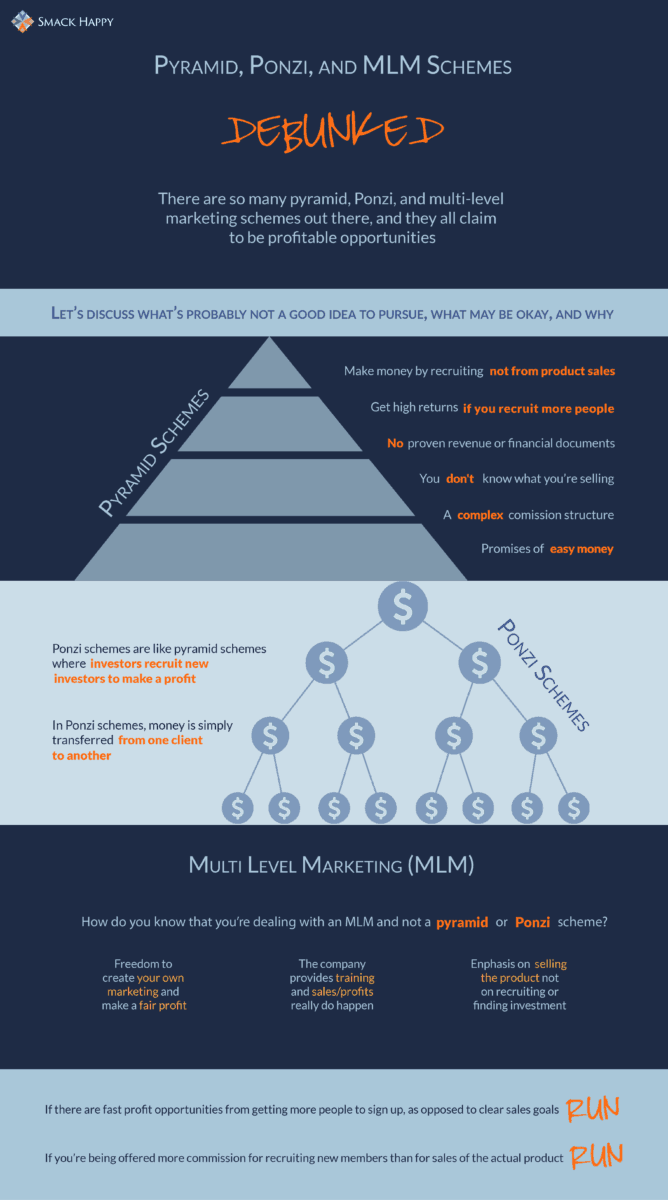Pyramid, Ponzi, and Multi-Level Marketing Schemes Debunked
Where do we begin? There are so many pyramid, Ponzi, and multi-level marketing schemes out there, and they all claim to be profitable opportunities. These (most likely) scams have been around in a variety of shapes and forms for a while, and unfortunately, they are getting harder and harder to discern.
Many of these schemes may look exciting on both ends. The product you think that you’re going to sell sounds exciting as well as the job of selling it. We don’t want any more of our friends and family to fall for this stuff. When you fall for the scams, you just end up with a ton of products and out a whole ton of money!
You have to stay vigilant and figure out what works for you and what is a scam. Let’s discuss what’s probably not a good idea to pursue and then what may be okay, and why.
Pyramid Schemes
Did you know that a pyramid scheme is defined as not selling an actual product? According to investor.gov (the U.S. Securities and Exchange Commission), the classic pyramid scheme is where “participants attempt to make money solely by recruiting new participants.” There is still a product being sold, but it is oftentimes not worth actually selling.
In case you needed more thorough a more visual explanation as to what a mess a pyramid scheme really is, well, visualize a pyramid. The top is whoever starts the pyramid scheme, next are the first recruits. The recruits invest some money in hopes to make a bigger profit. Following that are the exponential amounts of the recruits who are recruited by these recruits and then those recruited by the recruits of the recruited recruiters, and so forth. Does that sound ridiculous? That’s because it is ridiculous. Nobody profits from a pyramid scheme except those at the top.
Signs of a pyramid scheme include:
-
- More compensation for recruiting than actual product sales
- A promise of high return, but only if you recruit a certain number of people
- Promises of easy money
- No proven revenue
- You can’t ask to see financial documents from a CPA, or anyone.
- A complex commission structure
- More compensation for recruiting than actual product sales
You’re not sure what you’re selling, but the company is enthusiastic about you selling it. Products may include:
- Selling free gas
- Selling less expensive energy opportunities for your gas bill
- Complex tech services
- Free travel options
- Selling event coupons
- And more
The Lularoe Pyramid Scheme Lawsuit
Many have been attracted to purchasing clothing from Lularoe in order to try and resell the clothing at their own profit. Lularoe, which has turned out to be a very popular pyramid scheme, is facing legal action from multiple suits regarding its overall poor quality of clothing, problems with returns, and sales tax discrepancies.
Pyramid schemes always collapse. If you get in early, you may make a profit, but pyramid schemes are only fair to first few in the program, and whatever’s being sold is typically near worthless.
Ponzi Schemes
Ponzi schemes are like pyramid schemes where investors recruit new investors to make a profit. The terms are often used interchangeably, though they do have one major difference. The difference is, that in Ponzi schemes, money is simply transferred from one client to another, while in pyramid schemes, investors are actively recruiting new investors in order to make a profit.
Multi-Level Marketing (MLM)
Multi-level marketing, often referred to as MLM, is what many of these types of companies that we mentioned so far claim to be. Don’t get us wrong, MLM can be worthwhile. With the right, honest company, MLMs can give you the freedom to create your own marketing campaign (within limits, of course) and make a fair profit. Often the company provides training as well, and sales and profits really do happen.
So, how do you know that you’re dealing with an MLM and not a pyramid or Ponzi scheme? Simply put, business emphasis should be on selling the product, not on recruiting and finding more investment. So, even if there are fast profit opportunities from getting more people to sign up, as opposed to clear sales goals, run. And if you’re being offered more commission for recruiting new members than for sales of the actual product, run.
Popular companies such as Lularoe, Nu Skin, and Lip Sense and DoTerra all claim to be MLMs. Lularoe, for example, is actually just a fancy pyramid scheme. LipSense and DoTerra sell what they claim to sell, with a fairly reasonable profit coming from each sale. Regardless, we do not endorse any of these companies, but the differences are visible.
A Home Business Opportunity That’s Right for You
Make sure that your home business opportunity is right for you. Unless you absolutely adore a product, we think it’s often better to avoid MLMs all together, especially if you do not have any experience running your own business prior. Or if you’re considering creating an MLM, do so responsibly, not only to remain legal but for the sake of being fair to others.
If you think an upcoming business opportunity may have any qualities of being a pyramid, Ponzi, or multi-level marketing scheme—we’d be happy to connect and help you figure out your next steps.

Hello, Thanks for your Fabulous post on awareness about the Pyramid Scheme, Ponzi Scheme and MLM. Your used infographics in the post have made your post more interactive and easily understandable.